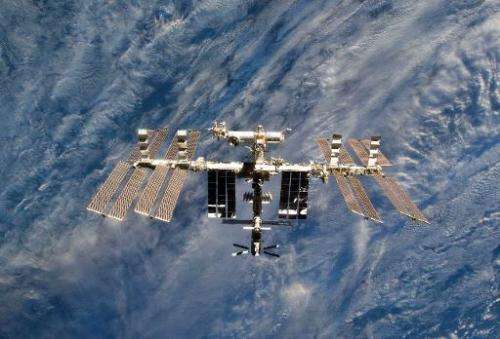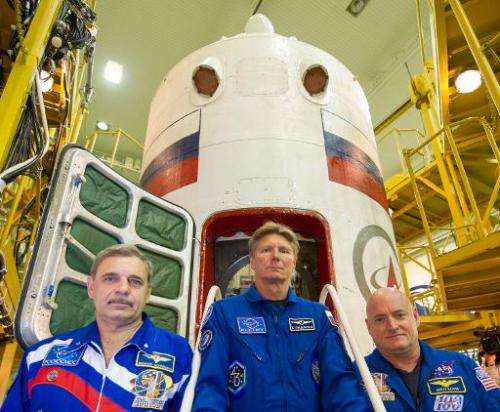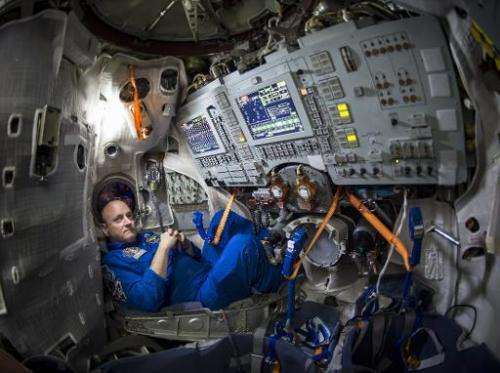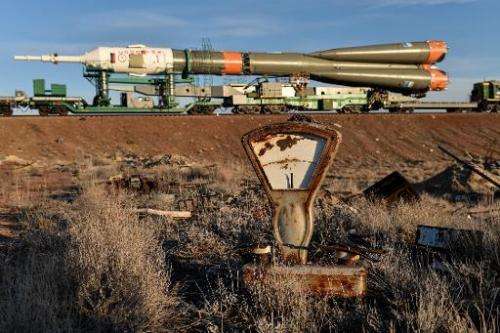Feud on Earth but peace in space for US and Russia

Hundreds of kilometres below on Earth, their governments are locked in a standoff over Ukraine—but up in space, Russian cosmonauts and American astronauts are still working together side by side.
The International Space Station (ISS) is one of the rare areas of US-Russian cooperation that has not been hit by the Ukraine crisis and in the latest show of commitment, the next joint mission is set to blast off from Kazakhstan on Friday.
The crew will include two space veterans—American Scott Kelly and Russian Mikhail Kornienko—who are down to become the first people to spend a whole year straight on the cosmic outpost, rather than the usual six months.
"We do our work that we love and we respect each other," Russian cosmonaut Alexander Samokutyaev said of life aboard the ISS after returning to Earth this month.
"Whatever the politicians want to get up to, that is their business," he told journalists at a press conference just after landing.
First launched as an international project back in 1998, the station was heralded as a symbol of the cooperation that emerged from the Cold War rivalry of the space race between the Soviet Union and United states.
And while the research outpost may technically be divided into Russian and American sections the truth, analysts say, is that neither country can run it on their own.
"The US and Russia need each other," American expert John Logsdon, a member of NASA's Advisory Council, told AFP.
'Like a marriage'
"It is like a marriage where divorce is almost impossible."
Since ending its Space Shuttle flights, the US has been dependent on Russian rockets to take astronauts and vital supplies to the space station, especially since the explosion of a commercial rocket in October cast doubt over a NASA deal to use private firms.

Meanwhile the American sector supplies the power to run the whole project and the Russian cosmonauts often rely on NASA's superior communications system to talk to Earth.
"Even though we are butting heads on Earth, up on the ISS we can't work without them and they can't work without us," Russian space expert Vadim Lukashevich told AFP.
"It's impossible to break up this cooperation."
As tensions over Ukraine spiralled, fears mounted that it was only a matter of time before the worst East-West standoff since the collapse of Communism would hit the space programme.
The US briefly blocked exports of certain defence-linked technologies to Russia that some thought would affect the cooperation in space.
But rather than affect work on the ISS, the Ukraine crisis might actually have helped cement it for the longer term.
Russia last month confirmed that it will continue using the International Space Station in partnership with NASA until 2024.
NASA had already said the ageing ISS will remain operational until 2024 but Moscow had threatened to pull out and stop financing it by 2020.
However, as Russia's economy has suffered economic strife in part due to sanctions imposed by the West over Ukraine, Moscow realised that it could no longer spare the cash to go it alone.

"Why did we decide to stay on the ISS until 2024? The answer is because we had no other option. The crisis also hit us," said Russian expert Lukashevich.
Mars barred
While cooperation on the station looks set to continue, it is likely that the next stage of space exploration—aimed at eventually putting someone on Mars—will be hit by deteriorating relations.
Beyond 2024, when the work on the ISS is set to end, as the situation stands now it seems unlikely that the two sides will agree on any major projects.
And experts say that without international cooperation, dreams of flying a manned mission to Mars will struggle to take off, or face lengthy delays at the very least.

For those being blasted into space now, that is a bitter pill to swallow.
They are hoping their governments can put aside current differences on Earth to bolster mankind's exploration of space for future generations.
"As to the International Space Station, it's a priceless experiment in international cooperation. We are learning to work together, and in my opinion the next step is interplanetary exploration of space, the moon or Mars," said Kornienko, the cosmonaut who is set to spend a year in space, in an interview on NASA's website.
"It's impossible to do it with one country alone, and the experience from international cooperation on the ISS will be very important here."
© 2015 AFP





















